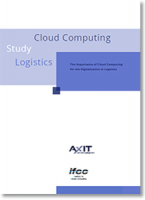The Importance of Cloud Computing for the Digitalization in Logistics
Cloud users are convinced that cloud computing will significantly push the topic of big data, as the technology is an enabler of big data; merging data from different sources and then being able to evaluate them across companies – the cloud is perfect for this.
The logistics sector is predestined for the use of cloud solutions, as flows of goods run across companies and require continuous management and monitoring of logistical processes.
Even though goods movements are already accompanied by information flows, the mapping of related processes is often not yet consistent.
Dynamic advancement is expected for the future, ensuring the uninterrupted flow of information in complex supply chain networks.
Progressing digitalization is an important forerunner of this development.
It will help the logistics sector achieve considerable efficiency improvements, ensure more security and reliability in logistical networks and lead to new service offers and business models.
Cloud technology provides the required infrastructure at the push of a button. It neither requires large investments nor long start-up phases. Like this companies can benefit from this technology’s advantages independently of the company size or financial capacity.
As cloud solutions enable cross-company digitalization of supply chains it represents the central success component in logistics. But in how far has cloud computing already been established in logistics? And how will the use of this technology develop in the sector in the future?
Answers to this can be found in this paper. It is – after a research conducted in 2012 – already the second survey which AXIT has done on the development of cloud technology in logistics in cooperation with the head of the Institute for Cloud Computing, Prof. Dr. Uwe Hannig.
A total of 218 logistics experts from 15 countries participated in the online survey which makes it one of the biggest of its kind in Europe.
The survey’s central goal was to determine the status quo of cloud computing for logistics as well as an outlook thereof and to compare the results with those from the initial survey in order to be able to verify the statements made then and to deduce marketrelevant trends. The structure of participating companies is comparable with that of 2012.
The share of companies which have not yet seriously addressed the options of cloud computing has dropped by 5 percentage points in the last four years.
On the other hand approval sets a clear signal: In the near future more than two thirds (70 per cent) of the interviewed German companies will use cloud solutions.
More than half the companies using cloud solutions in logistics also have a cloud strategy. For the majority of companies, dealing with this technology, it has strategic relevance.
And there is another connection which can be deduced from the figures: The bigger the company the more probable it is that a cloud strategy exists.
What’s Related


Favorites





